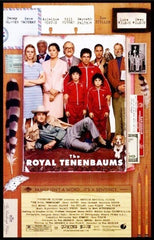Design of the Week | Wes Anderson and Hunt for the Wilderpeople
I watched Taika Waititi's new film, Hunt for the Wilderpeople recently. Thematically there are many similarities to the films of Wes Anderson, both in terms of the story and style. There are quick-zooms, quirky music, kids on the run from adults, dead-pan delivery, chapter headers, and ninety degree camera angles. Despite the similarities, I enjoyed Hunt for the Wilderpeople, particularly the film's protagonist, Ricky Baker (played by Julian Dennison), and in many ways it helped me to understand what I think of as Wes Anderson's successes and failures as a storyteller.
Wilderpeople possessed a humanistic core, and felt its most relatable when characters were striving—but more often failing—to connect with one another. The movie opens with Ricky being sent to a new foster family on the edge of the New Zealand bush. He's a rough urban kid, "a real bad egg," his case worker explains, known for "stealing, spitting, running away, throwing rocks, kicking stuff, loitering, and graffiti." Just as Ricky's new foster mother has finally won him over, she passes away suddenly, leaving him the charge of a hermit-like Sam Neill. Rather than be dragged back to the state's care, Ricky heads into the bush, where he and his foster father develop a mutual respect and understanding of one another.
 I believe Anderson is at his most triumphant when his work carries with it an emotional charge, as it does in The Royal Tenenbaums. On the surface it's a simple story about a dysfunctional family of hyper-intelligent eccentrics on the skids and their relationship with their selfish father, Royal. Rushmore, too, possesses this same charge as young Max—an awkward, self-absorbed teenager—struggles to find his way in the world, flailing and failing at one relationship after another.
I believe Anderson is at his most triumphant when his work carries with it an emotional charge, as it does in The Royal Tenenbaums. On the surface it's a simple story about a dysfunctional family of hyper-intelligent eccentrics on the skids and their relationship with their selfish father, Royal. Rushmore, too, possesses this same charge as young Max—an awkward, self-absorbed teenager—struggles to find his way in the world, flailing and failing at one relationship after another.
Those Anderson films that feel twee and stuffed with silly gags (The Darjeeling Limited, The Life Aquatic with Steve Zissou, Moonrise Kingdom), are due to perhaps their lack of this relatable, humanistic core.


Comments